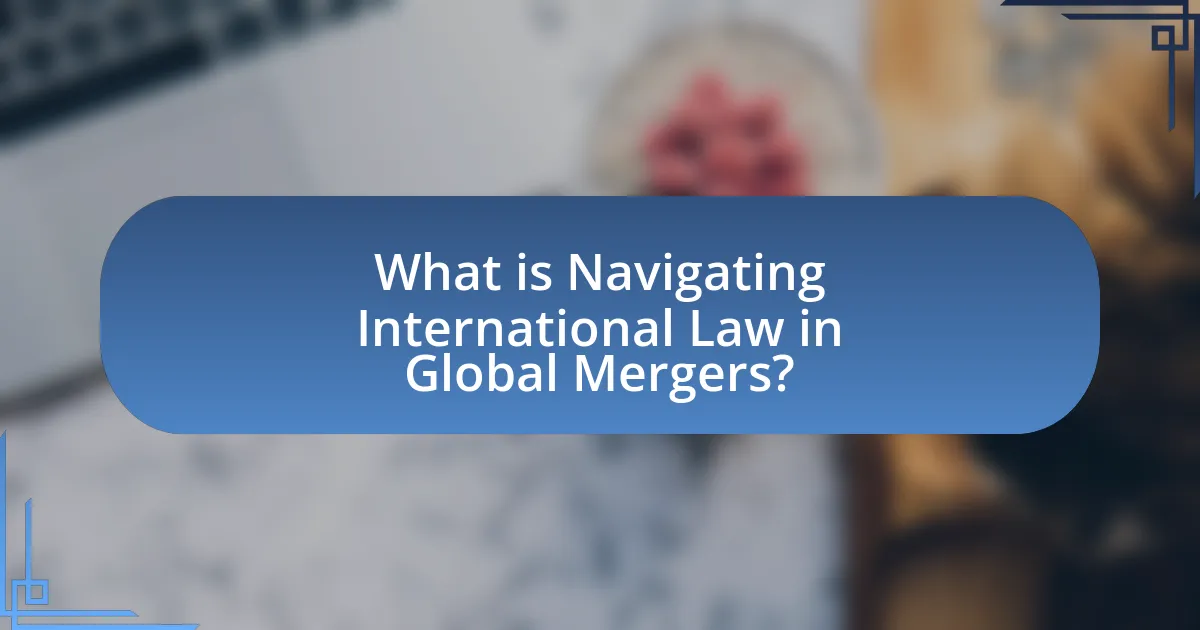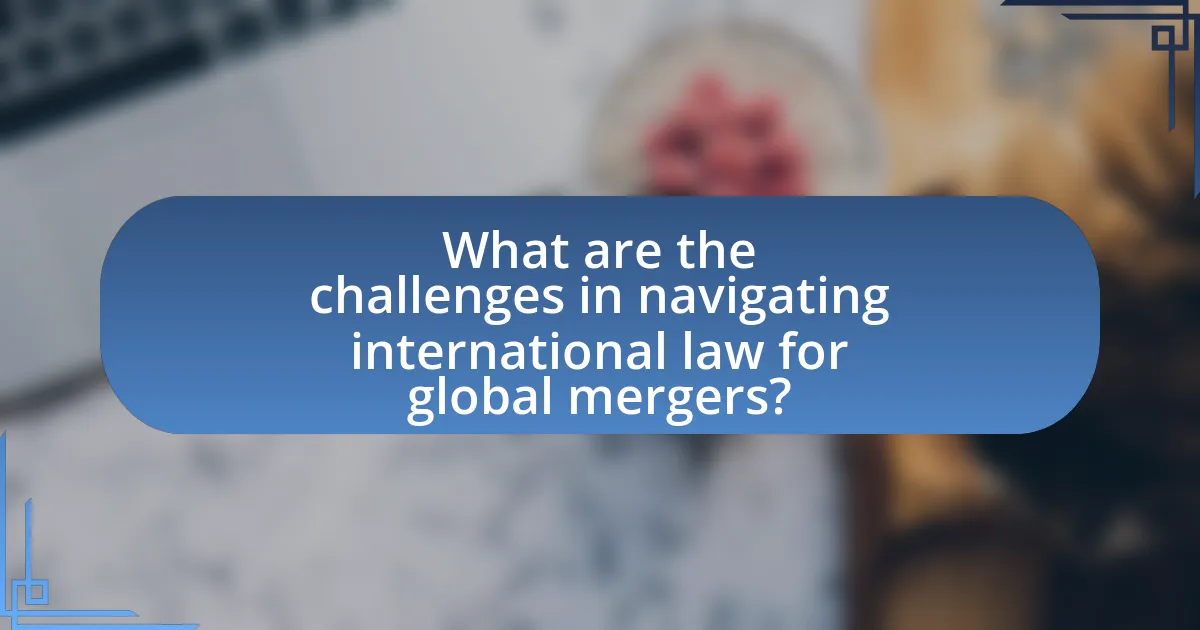Navigating international law in global mergers involves understanding the legal frameworks governing cross-border transactions, including antitrust regulations, foreign investment laws, and compliance with international treaties. The article outlines how international law impacts mergers by establishing regulatory requirements that vary by jurisdiction, emphasizing the importance of compliance to avoid legal disputes. Key principles such as sovereignty, non-interference, and competition protection are discussed, along with the challenges companies face due to differing regulatory frameworks. Additionally, the article highlights best practices for legal compliance, the role of negotiation in minimizing risks, and the significance of thorough due diligence in ensuring successful mergers.

What is Navigating International Law in Global Mergers?
Navigating international law in global mergers involves understanding and complying with the legal frameworks that govern cross-border transactions. This process requires firms to address various legal considerations, including antitrust regulations, foreign investment laws, and compliance with international treaties. For instance, the European Union has strict merger control regulations that assess the competitive impact of mergers on the market, while the United States enforces antitrust laws to prevent monopolistic practices. These legal frameworks are essential for ensuring that mergers do not violate national or international laws, thereby facilitating smoother transactions and reducing the risk of legal disputes.
How does international law impact global mergers?
International law significantly impacts global mergers by establishing regulatory frameworks that govern cross-border transactions. These laws dictate compliance requirements, antitrust regulations, and investment protections, which vary by jurisdiction. For instance, the European Union’s Merger Regulation requires companies to notify the European Commission of mergers that meet specific thresholds, ensuring that competition is not distorted within the single market. Additionally, international treaties, such as the OECD Guidelines for Multinational Enterprises, provide standards for responsible business conduct, influencing how companies approach mergers globally. Thus, adherence to international law is crucial for companies to navigate legal complexities and avoid penalties during global mergers.
What are the key principles of international law relevant to mergers?
The key principles of international law relevant to mergers include the principles of sovereignty, non-interference, and the protection of competition. Sovereignty dictates that states have the authority to regulate mergers within their jurisdictions, ensuring compliance with local laws. Non-interference emphasizes that foreign entities must respect the legal frameworks of the host country when engaging in mergers. The protection of competition principle aims to prevent anti-competitive practices that could arise from mergers, aligning with regulations set by international organizations such as the OECD and the European Union. These principles guide the legal landscape for cross-border mergers, ensuring that they adhere to both domestic and international legal standards.
How do different jurisdictions interpret international law in mergers?
Different jurisdictions interpret international law in mergers through varying legal frameworks and regulatory approaches. For instance, the European Union emphasizes competition law and market impact, requiring merger notifications to the European Commission for antitrust assessments. In contrast, the United States focuses on the Sherman Act and the Clayton Act, where the Federal Trade Commission and the Department of Justice evaluate mergers based on potential anti-competitive effects. Additionally, countries like China have specific merger control regulations that consider national security and economic interests, reflecting a more state-centric approach. These differences illustrate how international law is applied contextually, influenced by local legal traditions and economic priorities.
Why is understanding international law crucial for global mergers?
Understanding international law is crucial for global mergers because it governs the legal frameworks that affect cross-border transactions. International law establishes the rules for trade, investment, and competition, which are essential for ensuring compliance and mitigating risks in mergers involving entities from different countries. For instance, regulations such as the Foreign Corrupt Practices Act in the United States and the UK Bribery Act impose strict compliance requirements that can impact merger negotiations and operations. Additionally, understanding international law helps companies navigate antitrust regulations, which vary significantly across jurisdictions, thereby preventing legal disputes that could derail merger plans.
What risks arise from non-compliance with international law in mergers?
Non-compliance with international law in mergers can lead to significant legal and financial risks. These risks include hefty fines imposed by regulatory authorities, which can reach millions of dollars, as seen in cases like the European Commission’s penalties for antitrust violations. Additionally, companies may face delays in merger approvals, resulting in lost market opportunities and increased costs. Non-compliance can also lead to reputational damage, as stakeholders may lose trust in a company that disregards legal obligations. Furthermore, legal disputes may arise, leading to prolonged litigation that diverts resources and attention from core business operations.
How can companies mitigate legal risks in cross-border mergers?
Companies can mitigate legal risks in cross-border mergers by conducting thorough due diligence and ensuring compliance with both local and international laws. This process involves assessing the legal frameworks of the countries involved, identifying potential regulatory hurdles, and understanding the implications of antitrust laws. For instance, a study by the OECD highlights that companies that engage in comprehensive legal assessments prior to mergers are less likely to face litigation or regulatory penalties. Additionally, seeking legal counsel with expertise in international mergers can provide insights into jurisdiction-specific requirements, further reducing the risk of legal complications.

What are the challenges in navigating international law for global mergers?
Navigating international law for global mergers presents several challenges, including differing regulatory frameworks, compliance complexities, and jurisdictional issues. Each country has its own set of laws governing mergers and acquisitions, which can lead to conflicting requirements that companies must address. For instance, the European Union has stringent antitrust regulations that may differ significantly from those in the United States, complicating the approval process. Additionally, companies must navigate varying standards for due diligence, foreign investment restrictions, and tax implications across jurisdictions. These complexities can result in increased legal costs and extended timelines for merger approvals, ultimately impacting the feasibility and success of global mergers.
What legal complexities do companies face in different jurisdictions?
Companies face various legal complexities in different jurisdictions, including differing regulatory frameworks, compliance requirements, and enforcement mechanisms. For instance, companies operating in the European Union must adhere to the General Data Protection Regulation (GDPR), which imposes strict data privacy standards, while those in the United States may encounter a more fragmented regulatory landscape with varying state laws. Additionally, tax laws can differ significantly; for example, some jurisdictions may have favorable tax treaties that reduce withholding taxes on cross-border transactions, while others may impose high tariffs or restrictions on foreign investments. These complexities necessitate thorough legal analysis and strategic planning to ensure compliance and mitigate risks associated with international operations.
How do varying regulatory frameworks affect merger strategies?
Varying regulatory frameworks significantly influence merger strategies by dictating the legal requirements and approval processes that companies must navigate. For instance, in the United States, the Federal Trade Commission and the Department of Justice assess mergers based on antitrust laws, which can lead to lengthy reviews or even blockages if a merger is deemed anti-competitive. Conversely, in the European Union, the European Commission employs a more stringent approach, often requiring detailed economic analyses and compliance with EU competition laws, which can alter the structure or timing of proposed mergers. These differences compel companies to tailor their merger strategies to align with specific regulatory expectations, impacting decisions on deal structure, timing, and negotiation tactics. For example, a merger that may be permissible in one jurisdiction could face significant hurdles in another, necessitating adjustments to the overall strategy to ensure compliance and successful execution.
What role do international treaties play in merger regulations?
International treaties play a crucial role in merger regulations by establishing frameworks that govern cross-border mergers and acquisitions. These treaties facilitate cooperation among countries, ensuring that regulatory standards are harmonized and that antitrust laws are effectively enforced across jurisdictions. For instance, the OECD Guidelines for Multinational Enterprises provide recommendations on responsible business conduct, influencing national merger regulations. Additionally, treaties like the EU Merger Regulation set specific criteria for assessing mergers within the European Union, thereby impacting how member states approach merger approvals. Such frameworks help mitigate conflicts and promote fair competition in the global market.
How can companies effectively manage these challenges?
Companies can effectively manage challenges in navigating international law during global mergers by implementing comprehensive legal compliance strategies. These strategies include conducting thorough due diligence to understand the legal frameworks of all jurisdictions involved, which helps identify potential regulatory hurdles. For instance, a study by the International Bar Association highlights that 70% of cross-border mergers face legal challenges due to inadequate compliance with local laws. Additionally, companies should engage local legal experts to ensure adherence to specific regulations and facilitate smoother negotiations. By establishing a robust governance framework that includes regular training on international legal standards, companies can mitigate risks associated with non-compliance and enhance their ability to navigate complex legal landscapes.
What best practices should companies adopt for legal compliance?
Companies should adopt a comprehensive compliance program that includes regular training, risk assessments, and monitoring of legal obligations. Implementing a compliance program ensures that employees are aware of relevant laws and regulations, which is crucial in the context of international mergers where legal frameworks can vary significantly across jurisdictions. Regular risk assessments help identify potential legal vulnerabilities, allowing companies to address them proactively. Furthermore, continuous monitoring of compliance efforts ensures adherence to evolving legal standards, thereby reducing the risk of legal penalties and enhancing corporate reputation.
How can legal counsel assist in navigating international law?
Legal counsel assists in navigating international law by providing expertise in compliance with diverse legal frameworks across jurisdictions. They analyze the specific legal requirements of each country involved in a merger, ensuring adherence to regulations such as antitrust laws, foreign investment restrictions, and tax implications. For instance, legal counsel can help identify and mitigate risks associated with cross-border transactions, as seen in the 2018 merger between Disney and Fox, where legal teams navigated complex regulatory environments in multiple countries to secure approval. This expertise is crucial for avoiding legal pitfalls and facilitating smooth transactions in the global market.

What are the best strategies for successful global mergers under international law?
The best strategies for successful global mergers under international law include thorough due diligence, compliance with antitrust regulations, and effective cross-border negotiation. Conducting comprehensive due diligence ensures that all legal, financial, and operational aspects of the merging entities are assessed, which is crucial for identifying potential risks and liabilities. Compliance with antitrust regulations is essential, as many jurisdictions have specific laws governing competition that can impact merger approvals; for instance, the European Union’s Merger Regulation requires notification of mergers that meet certain thresholds. Effective cross-border negotiation involves understanding cultural differences and legal frameworks in various jurisdictions, which can facilitate smoother integration and cooperation between merging parties. These strategies are supported by case studies showing that companies that prioritize these aspects tend to achieve higher success rates in their merger endeavors.
How can companies prepare for legal due diligence in mergers?
Companies can prepare for legal due diligence in mergers by conducting a thorough review of all relevant legal documents and compliance requirements. This includes gathering contracts, corporate governance documents, intellectual property rights, and any pending litigation information. Additionally, companies should assess regulatory compliance in all jurisdictions involved, as international mergers often require adherence to various legal frameworks. For instance, a study by the Harvard Law School Forum on Corporate Governance highlights that comprehensive due diligence can uncover potential liabilities and ensure compliance with antitrust laws, which is crucial for a successful merger.
What documents are essential for legal due diligence in international mergers?
Essential documents for legal due diligence in international mergers include corporate governance documents, financial statements, contracts, regulatory compliance records, intellectual property registrations, employment agreements, and litigation history. Corporate governance documents, such as articles of incorporation and bylaws, provide insight into the company’s structure and decision-making processes. Financial statements reveal the financial health of the entities involved. Contracts outline obligations and rights, while regulatory compliance records ensure adherence to local and international laws. Intellectual property registrations protect proprietary assets, and employment agreements clarify workforce obligations. Lastly, litigation history helps assess potential legal risks. These documents collectively enable a comprehensive evaluation of the merger’s legal implications.
How can companies assess the legal environment of target countries?
Companies can assess the legal environment of target countries by conducting comprehensive legal research and analysis. This involves reviewing local laws, regulations, and compliance requirements relevant to their industry, which can be achieved through resources such as government publications, legal databases, and consultation with local legal experts. Additionally, companies should analyze case law and legal precedents to understand how laws are applied in practice. For instance, the World Bank’s “Doing Business” report provides valuable insights into the regulatory environment of various countries, highlighting factors such as ease of doing business and legal protections for investors. This data-driven approach enables companies to identify potential legal risks and ensure compliance with local laws, thereby facilitating informed decision-making in international mergers.
What role does negotiation play in navigating international law?
Negotiation is essential in navigating international law as it facilitates the resolution of disputes and the establishment of agreements between parties from different legal jurisdictions. Through negotiation, entities can address complex legal frameworks, harmonize differing legal standards, and create mutually beneficial terms that comply with international regulations. For instance, in global mergers, negotiation helps in aligning the interests of merging companies with the legal requirements of various countries, thereby reducing the risk of legal conflicts and ensuring smoother transactions. Historical examples, such as the negotiation processes in the merger of Daimler-Benz and Chrysler, illustrate how effective negotiation can lead to successful compliance with international law, ultimately fostering cooperation and stability in cross-border business activities.
How can effective negotiation strategies minimize legal risks?
Effective negotiation strategies can minimize legal risks by ensuring clear communication and mutual understanding of terms between parties. When negotiators establish well-defined agreements, they reduce ambiguities that could lead to disputes or litigation. For instance, incorporating specific clauses that address potential legal issues, such as compliance with international regulations, can prevent future conflicts. Research indicates that structured negotiation processes, which include thorough preparation and risk assessment, significantly lower the likelihood of legal challenges, as evidenced by a study published in the Harvard Negotiation Law Review, which found that 70% of disputes arise from misunderstandings in contract terms. Thus, effective negotiation not only clarifies expectations but also proactively addresses legal concerns, ultimately safeguarding against potential liabilities.
What are common negotiation pitfalls in international mergers?
Common negotiation pitfalls in international mergers include cultural misunderstandings, lack of due diligence, and misalignment of objectives. Cultural misunderstandings can lead to miscommunication and conflict, as different countries may have varying negotiation styles and business practices. Lack of due diligence can result in unforeseen liabilities or regulatory issues, as companies may overlook critical legal and financial assessments. Misalignment of objectives occurs when the merging parties have different goals or expectations, which can derail negotiations and lead to failed mergers. These pitfalls are supported by studies indicating that cultural differences account for 30% of merger failures, while inadequate due diligence is cited in 70% of unsuccessful mergers.
What practical tips can companies follow for successful navigation of international law in global mergers?
Companies can successfully navigate international law in global mergers by conducting thorough due diligence, understanding local regulations, and engaging legal experts in relevant jurisdictions. Thorough due diligence ensures that companies identify potential legal risks and compliance issues associated with the merger, which is critical given that different countries have varying laws governing mergers and acquisitions. Understanding local regulations allows companies to align their merger strategies with the legal frameworks of the countries involved, thereby minimizing the risk of legal disputes. Engaging legal experts familiar with international law and the specific jurisdictions involved provides companies with insights into regulatory requirements and helps in navigating complex legal landscapes. These practices are essential as they mitigate risks and enhance the likelihood of a successful merger.


